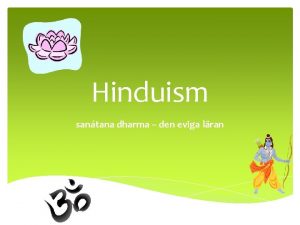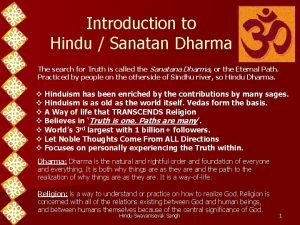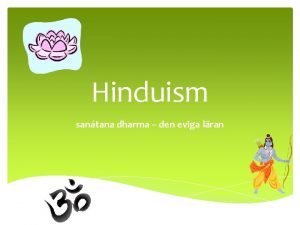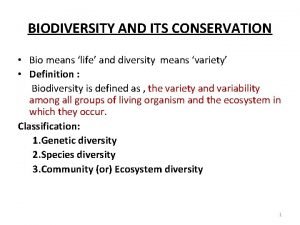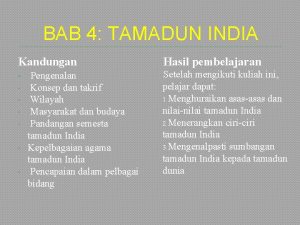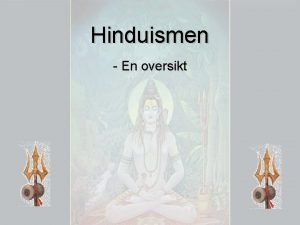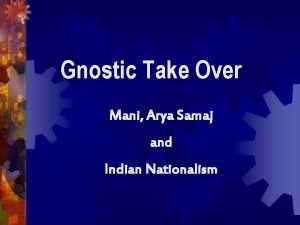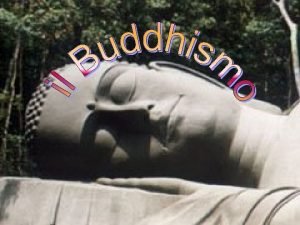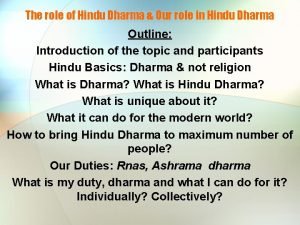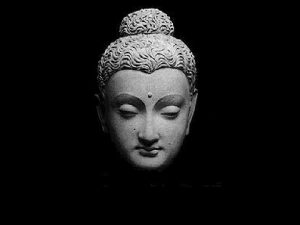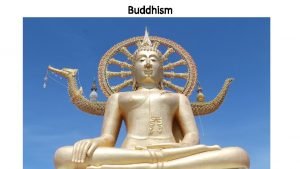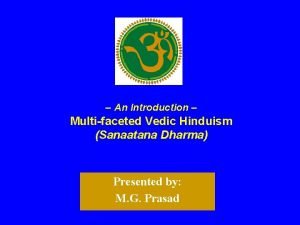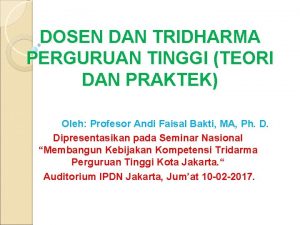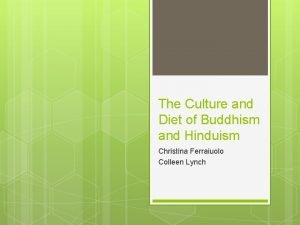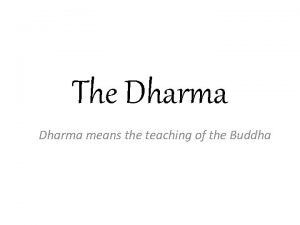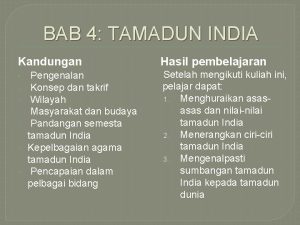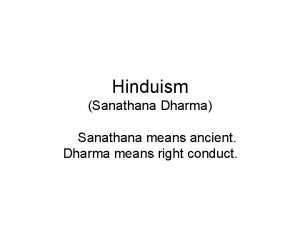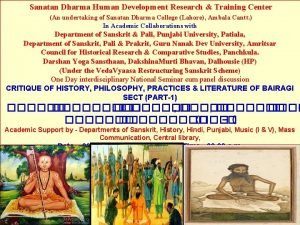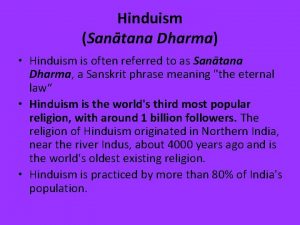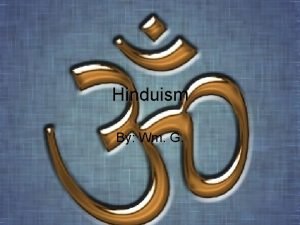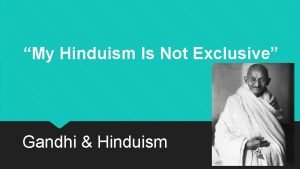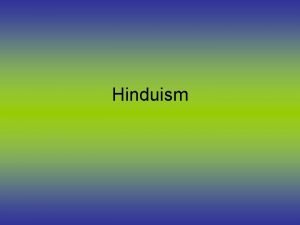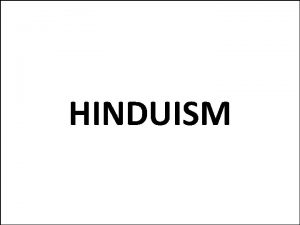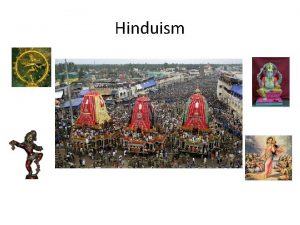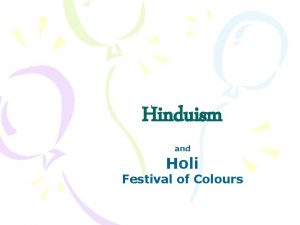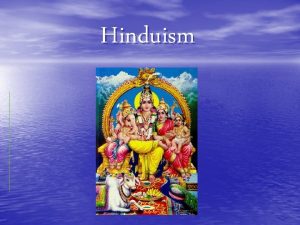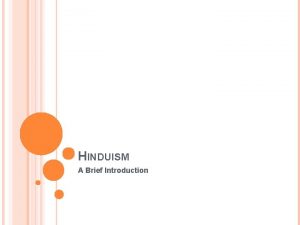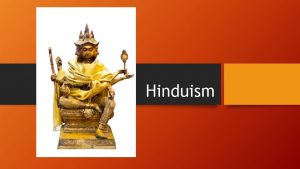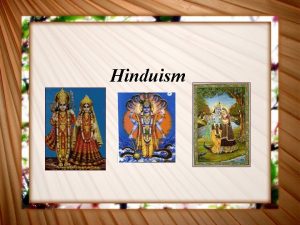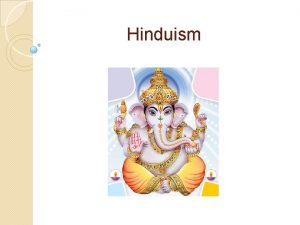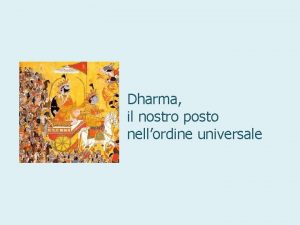Hinduism Sanatan Dharma What Hinduism Sanatan Dharma means




























- Slides: 28

Hinduism (Sanatan Dharma) What Hinduism (Sanatan Dharma) means ? Yogesh Mehla yogesh. mehla@gmail. com

Resources for Language • http: //en. wikipedia. org/

What is Hinduism? • Hinduism is the dominant religion of the Indian subcontinent, and consists of many diverse traditions. a wide spectrum of laws and prescriptions of "daily morality" based on karma, dharma, and societal norms. Hinduism is a categorisation of distinct intellectual or philosophical points of view, rather than a rigid, common set of beliefs. Their are 330 millions gods/goddesses in Hinduism.

Detail: • You will find many people saying Hinduism is not a religion it is way of life. • Because Hinduism doesn't force any one to follow a belief. • Most commonly you will find maximum families consist of 4 people and you can even find all members worshiping different deities/goddesses. Also in different ways. Also respecting others belief.

• But their are common beliefs too: 1. Taking bath before worshiping because body is consider as 1 st temple man/women should worship. 2. Taking bath before cooking as kitchen is consider as 2 nd temple of every home.

Who is Hindu? • To be a Hindu you can be: • Polytheism is the worship of or belief in multiple deities usually assembled into a pantheon of gods and goddesses, along with their own religions and rituals. • Monotheism is defined by the Encyclopædia Britannica as belief in the existence of one god or in the oneness of God.

Who is Hindu? • Atheism is, in a broad sense, the rejection of belief in the existence of deities. In a narrower sense, atheism is specifically the position that there are no deities.

Who is Hindu? • Hindus worships nature (trees, rivers, sun, moon, cow, dog, cat, lion, tiger, etc). • So If I combine my last three slides. • To be a good hindu you can worship one god or multiple gods/goddesses or tree or cow or river or no god then also you can be a good Hindu.

Who is Hindu? • According to our sacred text name Bhagavad Gita. • Hindu or can say any Human is defiend by his Karma (means deeds) done by Human. • It is not important that you worship a god or goddess or not. • If you have done any sin then even if you worship a god you will be punished as an act of your deed.

Who is Hindu? • What are punishments ? • Their is no punishment like burning in hell or other things. Yes their is also place consider where suffering after lifes are given. • But if you did any thing like murder or any other crime and you get punished by your court and sent to jail then also it is considered as punishment as result of your Karma (deed).

What is Karma? • Karma means action, work or deed it also refers to the principle of causality where intent and actions of an individual influence the future of that individual. Good intent and good deed contribute to good karma and future happiness, while bad intent and bad deed contribute to bad karma and future suffering.

Way to God? • Karma yoga: As noted by various commentators, the Bhagavad Gita offers a practical approach to liberation in the form of Karma yoga. The path of Karma yoga upholds the necessity of action. • (Karma yoga also include full filling your all duties on time is also way to god) • Bhakti yoga: The introduction to chapter seven of the Bhagavad Gita explains bhakti as a mode of worship which consists of unceasing and loving remembrance of God. Faith (Śraddhā) and total surrender to a chosen God (Ishta-deva) are considered to be important aspects of bhakti.

Way to God? • Jnana yoga: Jnana yoga is the path of wisdom, knowledge, and direct experience of Brahman as the ultimate reality. The path renounces both desires and actions, and is therefore depicted as being steep and very difficult in the Bhagavad Gita.

About Peace • In Hinduism Peace holds a great part. If you under stand theory of Karma then it is very easy to understand that if you will give love then in return you will get love if you will impart peace then you will get peace in return. Fruit you get is from seed you planted. • Buddhism, Sikhism and Jainism are religions which were formed from Hinduism. Lots of learning and knowledge between these four religion is common. Out of which PEACE is one.

Worshiping images • According to Hindu God is every where, God is in stone, is in river, is in child, is in human, is in air or every where. • People worship images, stones, statues even food as Hindu beliefs God is every where.

MAN and WOMEN • Both are consider as equal. As one of the main god that is shiv is not full without shakti which represents women.

MAN and WOMEN • To support this: • It is considered that all 3 essentials things which are: – Money/Property – Power/Strength – Knowledge are gift of 3 goddesses which are: Laxmi Durga Saraswati

Life of a man and women • Life of man and women are divided into stages: – Student till 25 – Martial life (25 -50) – Devoting them self to Bhakti

Why so many gods/goddesses? Is it mandatory to worship all? • In Hinduism it is not important to worship all or any god/goddess. It totally depends upon you.

Why so many gods/goddesses? Is it mandatory to worship all? • Apart from this, In Hinduism their are gods in every family. E. g. • Mother is considered as biggest god for his son/daughter • Fathers comes after. • Teacher are also consider as god as they give lessons of life and knowledge. • For women her husband is also god. • Even if their is a case son or daughter is grown up by some other man and women that person is consider as god for that child.

Why so many gods/goddesses? Is it mandatory to worship all? • It is first Duty or Dharma of every individual to first complete his/her responsibilities for their mother/father/children. If he/she fails then his/her worship is not accepted by any god/goddess he/she follows.

Other Religion • In Hindu families respecting other religion is specially taught as, it is saying that if we don't know much about any thing then we should not discriminate that also we should respect others feelings. • There is no restriction on any one on visiting other religious places.

History which effected Hindu and India • Gurukula or gurukul (Sanskrit: ������� ) is a type of school in India, residential in nature, with pupils (shishya) living near the guru, often within the same house. Prior to British rule, they served as South Asia's primary educational institution. The gurushishya tradition (parampara) is a hallowed one in Hinduism and appears in other religious groups in India, such as Jainism, Buddhism and Sikhism.

History which effected Hindu and India • Nalanda University was the first great university in recorded history and one of the world's first residential university as it had dormitories for students. It is also one of the most famous universities. In its heyday, it accommodated over 10, 000 students and 2, 000 teachers. The university was considered an architectural masterpiece, and was marked by a lofty wall and one gate. Nalanda had eight separate compounds and ten temples, along with many other meditation halls and classrooms. On the grounds were lakes and parks. The library was located in a nine storied building where meticulous copies of texts were produced.

History which effected Hindu and India • The Manu smṛti (or "Laws of Manu", Sanskrit Manusmṛti ����� ; also known as Mānava-Dharmaśāstra ������� ), is the most important and earliest metrical work of the Dharmaśāstra textual tradition of Hinduism. • The text presents itself as a discourse given by Manu, the progenitor of mankind to a group of seers, or rishis, who beseech him to tell them the "law of all the social classes“


Lesson from Bhagavad Gita • Whatever happened, happened for good. Whatever is happening, is happening for good and whatever will happen for good. What have you lost that you are crying for? Whatever you have gained, you have gained here. Whatever you have lost, you have lost here. What belongs to you today, belonged to someone else yesterday and will belong to someone else tomorrow. CHANGE is the eternal rule of life. So don’t focus on the result but do your karma.

Thank you • If you feel any thing right or wrong during this lecture then please do mail me on address below. Your suggestions are always welcome. • Email: yogesh. mehla@gmail. com
 Sanatan dharma
Sanatan dharma Dharma hinduismen
Dharma hinduismen Principles of dharma
Principles of dharma Sanatana dharma hinduism
Sanatana dharma hinduism Helig veckodag hinduism
Helig veckodag hinduism Sanata in english
Sanata in english Meta means in metamorphism
Meta means in metamorphism In situ conservation
In situ conservation Triangle quadrilateral pentagon hexagon octagon
Triangle quadrilateral pentagon hexagon octagon Bio means life logy means
Bio means life logy means Meta means in metamorphism
Meta means in metamorphism Konsep ashrama dharma
Konsep ashrama dharma Hva betyr: «santana dharma»?
Hva betyr: «santana dharma»? Dharma location
Dharma location La ruota della santa messa
La ruota della santa messa What is dharma
What is dharma Dharma marketing
Dharma marketing Dharma wijewickreme
Dharma wijewickreme Wheel of dharma meaning
Wheel of dharma meaning Feudalism meaning in english
Feudalism meaning in english Dharma
Dharma Sndp movement in kerala
Sndp movement in kerala Universitas sanata dharma logo
Universitas sanata dharma logo Tri dharma perguruan tinggi
Tri dharma perguruan tinggi Dharma usaha
Dharma usaha Buddhist dietary restrictions
Buddhist dietary restrictions Kasus pelanggaran kode etik guru
Kasus pelanggaran kode etik guru Dharma
Dharma Ashrama dharma tamadun india
Ashrama dharma tamadun india

